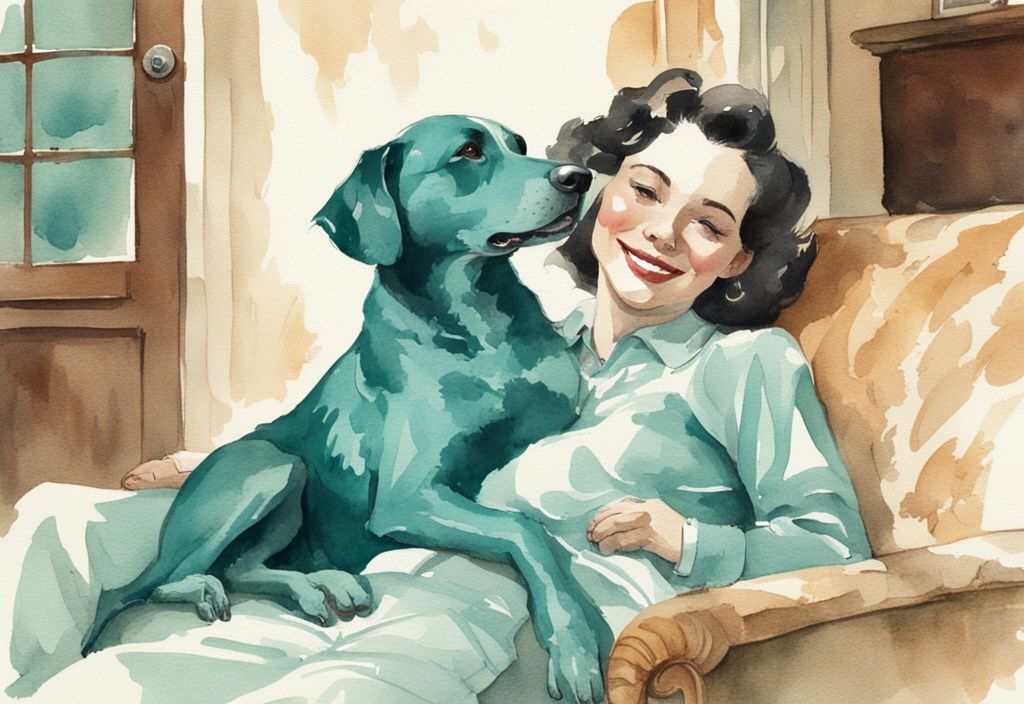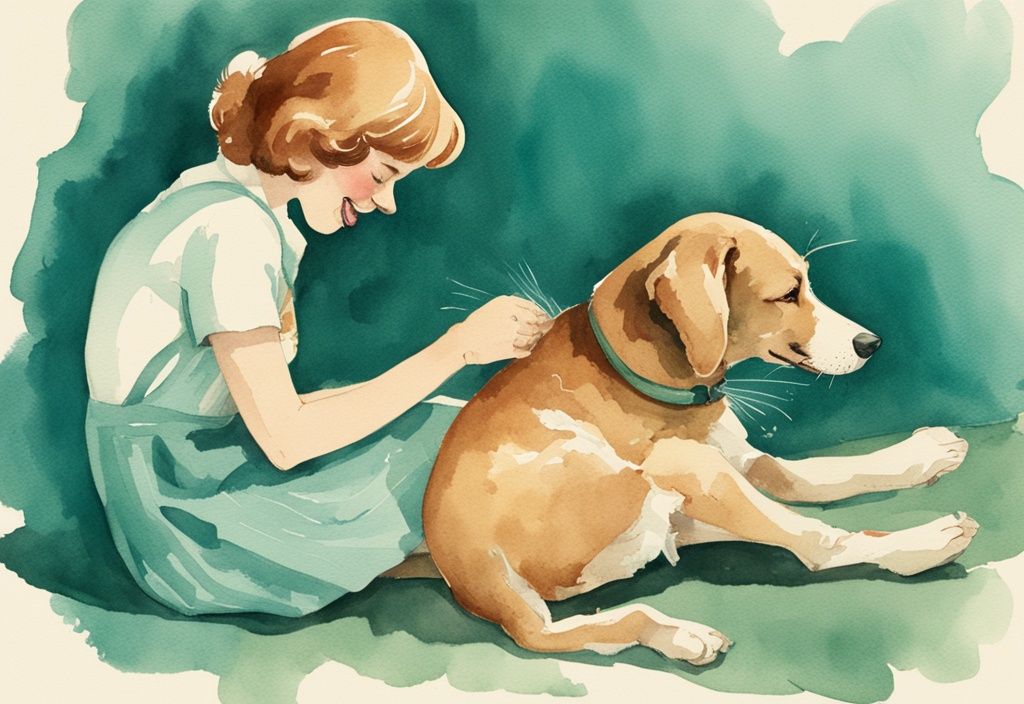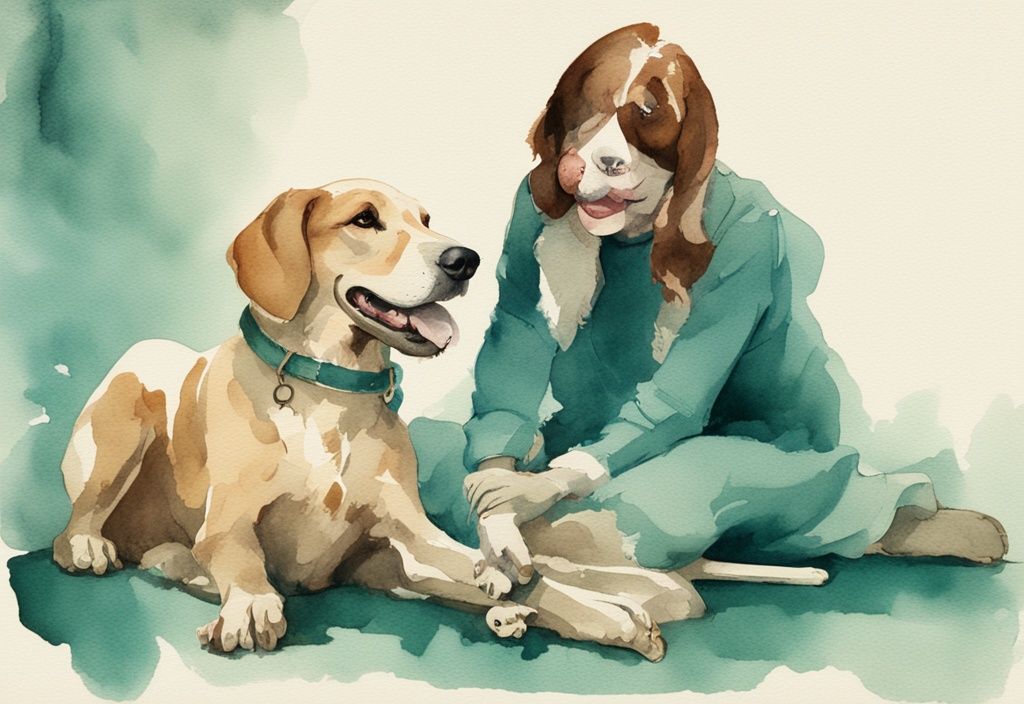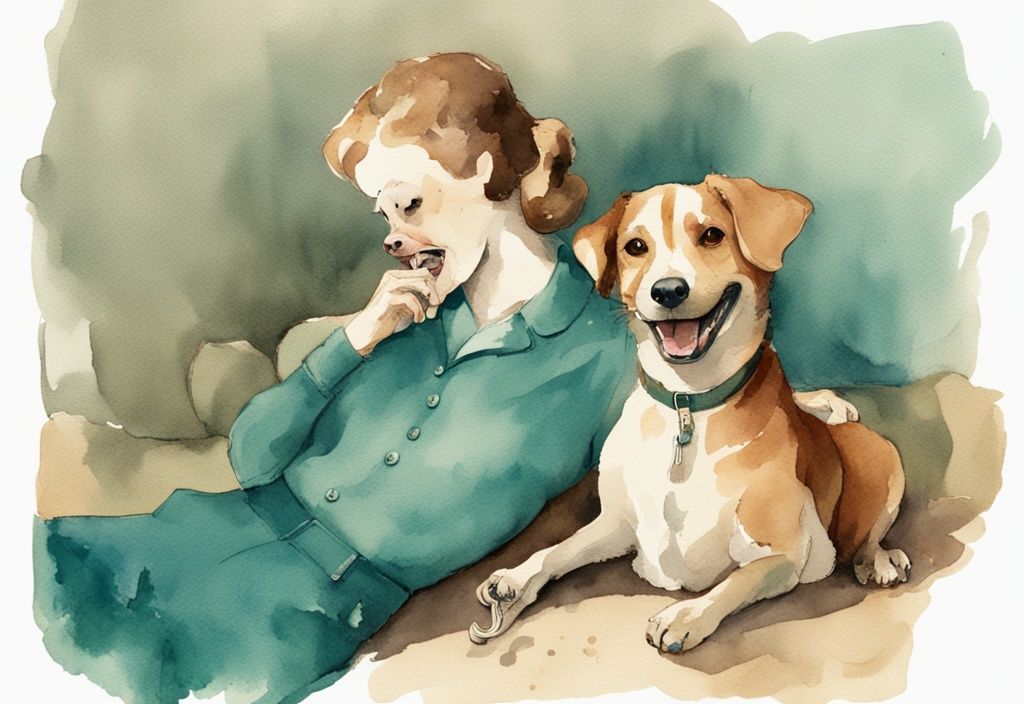“Have you ever pondered, ‘Why does my dog chew his bone on me?’ I found myself asking this very same question as my loveable Labrador decided my lap was his new favorite bone-chewing spot. It’s a peculiar behavior that can leave us feeling like living chew toys. But no worries, I’m here to spill the kibble on why our furry friends do this!
Sure, it might seem a bit odd or perhaps even irritating, but it’s not without reason. It can be a display of trust, a show of affection, or even a simple yearning for a bit more attention. Figuring out why is akin to decoding their little love language.
In this article, I’ll be dishing out insights on what’s going on when your pup decides you’re the perfect place to enjoy his bone. From intriguing behavioral factors to effective ways to manage it, we’ll explore this canine quirk together. Here’s to understanding our furry friends better and strengthening that incredible bond we share!”
Unraveling the Mystery: Why Does My Dog Chew His Bone on Me?
The Natural Instinct to Chew
Chewing is a deeply ingrained behavior in dogs, stemming from their wild ancestors like wolves and foxes. Our furry friends chew on toys and bones to fulfill this primal urge. This essential activity not only keeps their teeth sparkling and free from plaque and tartar, but it also promotes healthy gums, especially during those teething phases. Plus, it’s a great way for dogs to stay mentally stimulated, offering them entertainment that soothes and enriches their well-being.
Trust and Affection: Sharing Their Prized Possession
Ever wondered, “why does my dog chew his bone on me?” It’s a touching gesture, brimming with trust and affection. When your dog decides to chew a bone while nestled against you, it’s their way of saying they enjoy your company. This behavior suggests your dog feels secure and comfortable around you, considering you part of their safe haven. Sharing a prized possession like a bone is a profound display of their bond with you, much like how they might snuggle with other dogs while chewing bones together.
Attention Seeking: Is it a Call for Interaction?
Dogs often see their owners as their main playmates, with interactive play being a cornerstone of their happiness. When your dog chews a bone on you, it might be their gentle way of nudging you for attention. They thrive on your proximity and the occasional pats or encouraging words you give them during this time. If you’ve been responding positively to this behavior, you’re reinforcing it, turning it into a habitual way for your dog to get your attention. Grasping why your dog chews his bone on you can help identify if they’re craving more playtime and interaction with you.
Possible Psychological Underpinnings of This Behavior
Does your dog ever bring his bone over to chew right on you? While it may seem quirky, there’s actually a lot going on in that furry head of his.
Reinforcement Through Past Behavior
Dogs are absolutely creatures of habit. Think about it: if your dog has chewed his bone on you before and you’ve responded with affection or praise, he’s likely made a mental note. To him, this is a win-win situation. He gets to indulge in his bone and receive your love at the same time. Such positive reinforcement turns this behavior into a cherished routine. Unlike us, dogs thrive on these consistent cycles of rewards, which can explain why he brings his bone to you, anticipating that same joyful reaction.
Canine Social and Territorial Signals
In the intricate world of canine social dynamics, your dog definitely sees you as his pack leader.
Chewing a bone on you could very well be his way of acknowledging your special role in his life. Moreover, dogs have an innate drive to mark territory. When he chews his bone on you, it’s almost like he’s saying, “Hey, you’re part of my world!” By doing this, he’s leaving his scent on you, subtly marking you as his own and warding off any potential threats. It’s his adorably quirky way of staking his claim and ensuring you stay within his circle of trust and protection.
Stress or Anxiety: A Coping Mechanism
Just like people, dogs have their own ways of coping with stress or anxiety. Chewing often serves as a comforting, self-soothing activity. When your dog chooses to chew his bone on you, he’s seeking that extra layer of comfort and reassurance your presence brings. Imagine it: the rhythmic act of chewing combined with being close to his favorite person can be immensely calming for him. This behavior isn’t just about the bone; it’s a heartfelt plea for emotional support. He’s using you as a safety anchor, finding solace in your proximity during moments of unease.

Health Perspectives: Is This Behavior Harmful?
When considering the question “why does my dog chew his bone on me,” it’s essential to delve into several health perspectives that may shed light on this intriguing behavior. Understanding these perspectives can help you determine if the behavior is harmless or requires attention.
Possessiveness and Aggression: Should You Be Concerned?
While your dog chewing his bone on you is usually quite harmless, there are moments when it might hint at deeper issues. If your dog begins to display possessiveness over the bone, it’s worth paying attention.
Aggression over a bone is a red flag, possibly indicating a developing possessive trait. This can be risky not just for you, but also for other pets or people in your household. Think about it – if your furry friend starts guarding that bone jealously, how might that affect their interactions with everyone else?
Carefully observe your dog’s behavior to decide if you should encourage this habit or curb it. If possessiveness creeps in, addressing it early with the help of a professional trainer or behaviorist is crucial. They can offer effective strategies to modify this conduct, making home life safer and happier for all.
Underlying Dental or Health Issues
Sometimes, when a dog consistently chews bones on you, it could be a sign of underlying health issues like dental discomfort or nutritional deficiencies.
Dental troubles such as gum disease, tooth decay, or teething in younger dogs could drive them to seek relief through constant chewing. Similarly, a shortfall in their diet might push them to chew more aggressively. Think of it as their way of trying to communicate an unfulfilled need or discomfort.
Make it a routine to monitor how often and intensely your dog chews. If it seems excessive, consult a vet. A professional can identify if there’s an underlying health issue and recommend suitable treatments or dietary changes, ensuring your pooch feels more comfortable and less compelled to chew incessantly.
Parasitic Infestations: Are They a Matter of Worry?
Another potential reason behind dogs chewing bones on you could be parasitic infestations. Fleas, ticks, or mites can cause significant discomfort, prompting behaviors aimed at reducing irritation.
Imagine your dog using chewing as a way to distract themselves from the itchiness these pesky parasites cause. Left untreated, these parasites carry the risk of more severe health issues. Regularly checking your dog for signs of infestations and adhering to a preventive regimen is important.
If you suspect your dog’s relentless chewing might be linked to parasites, it’s important to understand why your dog may be acting weird. Seek veterinary assistance. A vet can address the infestation and help ease your pet’s discomfort, restoring tranquility to your shared moments. Learn more about why your dog is acting weird.
Proactive Steps: How to Manage and Modify This Behavior
Managing and modifying the behavior of your dog chewing bones on you requires a multi-faceted approach. This section covers setting personal boundaries, teaching effective training commands, and offering alternative chew toys to help steer your dog towards more appropriate behavior.
Creating Personal Boundaries and Redirection Techniques
Setting clear boundaries plays a key role in managing your dog’s behavior. Start by designating specific areas in your home where your dog is allowed to chew toys or bones. Maybe a cozy spot in your living room or a comfy corner in another room can serve as their special chewing zone. By training your dog to recognize these boundaries consistently and patiently, you’re setting the groundwork for better behavior.
When your dog decides to chew their bone on your lap, calmly get up and move away. This non-verbal cue gracefully communicates that their behavior isn’t acceptable without feeling punitive. Over time, your dog will associate lap-chewing with losing their cozy spot and will be more inclined to chew in the designated areas you’ve set up.
Effective Training Commands to Curb Excessive Chewing
Training commands are a powerful tool in curbing excessive chewing habits. Commands like “off” or “down” can be incredibly effective in redirecting your dog’s behavior. Use these commands consistently whenever your dog starts to chew on you, pairing them with a gentle but firm tone to reinforce your message.
Positive reinforcement is your best friend here. Whenever your dog listens to the command and stops chewing, shower them with praise or offer a small treat. This builds a positive association with the command and encourages your dog to respond correctly in the future. Consistency is your ally in this process.
Providing Alternative Chew Toys: A Practical Solution
Offering your dog alternative chew toys is a straightforward yet highly effective way to prevent them from chewing bones on you; you can also explore the benefits and risks of various chew treats for dogs by clicking here. High-quality chew toys or bones designed for dental health can serve as a great distraction. Ensure these toys are easily available to your dog in their designated areas.
Creating a designated play area stocked with a variety of chew toys can encourage your dog to chew and play independently. This area can include comfy bedding, interactive toys, and chew bones that your dog loves. Providing attractive alternatives makes it much easier for your dog to choose their toys over your lap, promoting healthier and more independent play habits.
Professional Intervention: When and How to Seek Help
Sometimes, understanding why does my dog chew his bone on me requires a bit more than just observation and patience. Here’s how to know when it’s time to seek professional help and what steps to take to ensure your furry friend’s well-being.
Recognizing and Dealing with Aggressive Behavior
Understanding why does my dog chew his bone on me is essential. However, it’s crucial to recognize when this behavior starts to veer into aggression or possessiveness. If your dog begins to growl, snap, or show other signs of aggression while chewing his bone on you, it’s a clear signal that professional intervention is needed.
Aggressive behavior can escalate quickly, leading to unsafe situations for both you and your dog. Seeking immediate help from a qualified professional ensures that the behavior is addressed correctly and that safety is maintained. By consulting with a certified dog trainer or behaviorist, you can receive tailored guidance on managing and redirecting your dog’s aggressive tendencies. If you’re wondering, “why do I love my dog so much,” understanding the bond between you and your pet can also help in managing behavioral issues. Learn more about the reasons behind your deep affection for your dog. These professionals have the expertise to evaluate the root cause of the behavior and implement effective training techniques to mitigate it.
Timely intervention is essential to prevent the behavior from becoming more ingrained and difficult to change.
Importance of Consulting with a Veterinarian or Dog Behaviorist
If you find yourself pondering why does my dog chew his bone on me, and if the behavior persists or escalates, seeking professional help from a veterinarian or a certified dog behaviorist is crucial. These experts can provide an in-depth assessment of your dog’s overall health and behavioral patterns.
Regular dental check-ups are vital, as dental discomfort might be driving your dog to chew excessively. A balanced diet is equally important to prevent nutritional deficiencies that could contribute to obsessive chewing. If you’re noticing other unusual behaviors, like frequent sneezing, it might be helpful to explore why my dog keeps sneezing to ensure there are no underlying health issues.
Veterinarians can identify any underlying health issues and offer medical solutions if needed, while behaviorists can implement behavior modification programs. Engaging with professionals addresses the specific issue and ensures the long-term well-being of your pet.

This approach helps you maintain a happy and harmonious relationship with your furry friend.
FAQ
Why does my dog prefer to chew his bone on my lap?
Aww, isn’t it endearing when your furry friend finds your lap to be the ideal spot for a good chew session? Dogs might pick your lap due to the stability and security it provides. Just imagine it—a cozy nook where they feel safe and loved. Plus, they crave your affection and enjoy being close, making it a comforting experience for them. Your lap also doubles up as a perfect leverage point for chewing, making it all the more appealing.
Can it be harmful if my dog consistently chews bones on me?
While this behavior is often harmless, it’s important to keep an eye out for any signs of possessiveness. If your dog starts to guard their bone or become overly attached, it might turn into a problem. Additionally, consider any underlying health issues that could be lurking. Regularly monitoring your dog’s behavior and health is crucial to ensure everything stays in balance.
How can I gently stop my dog from this behavior?
If you’re thinking of gently nudging your pup towards a new habit, start by redirecting their attention to other toys or treats. Use training commands like “off” or “down,” and establish clear boundaries for designated play areas. Consistency is the magic word here—reinforcing these new habits will gradually help modify their chewing behavior. And remember, patience and love go a long way in ensuring a happy transition for your furry friend.
Conclusion
Understanding why does my dog chew his bone on me can illuminate the underlying motivations behind this behavior, making it easier to manage.
Dogs often choose to chew their bones on their owners due to trust, affection, or seeking attention. Addressing this behavior starts with proper training and setting boundaries. Training your dog with commands and establishing clear zones for chewing can effectively curtail the habit.
Furthermore, ensuring your dog’s overall health is paramount. Regular dental check-ups and meeting their nutritional needs contribute to their well-being and can reduce excessive chewing triggers.
It’s equally important to watch for signs of possessiveness or aggression, as these might require more immediate intervention. When basic measures don’t suffice, don’t hesitate to seek professional guidance. Consulting with a veterinarian or a certified dog behaviorist can offer invaluable insights and tailored solutions.
They can help identify potential health issues or psychological triggers, ensuring both you and your furry friend maintain a harmonious and happy relationship.
